Foremost I want to say that I wish I had more time to reference this article like a mad man. It's a topic I feel passionate about, and if I had more of the ultimate commodity - time - I'd love to make this piece as tight as the jam George Pell is currently in. Nevertheless, do not be disillusioned. The truth is out there and although my writing style may have the journalistic integrity of the ABC reporting on the NBN, just remember I ain't in the business of journalism, and I ain't in the business of watertight integrity.
I am in the business of shining a light (albeit with a Zippo) on what I feel is wrong, or on what I feel needs to be published.
It is up to you, the reader, to find out the facts: sorry about that, but I'm not here to spoon feed you like a late-19th century mother spoon feeding her coughing child Bayer brand Heroin.
I'm a university student, like many of you. I am in the same system that is unfair, illogical, out-dated, and downright irrelevant. What was once a noble pursuit of knowledge, a huge attempt at raising our of standard of living, and an enlightening of the mind, has now boiled down into a mere necessity to access an average job, a black hole of debt, and the real crux: a big bad business.
University is nothing more than another business, here to drain customers of their money while dreaming up new ways to keep the profits rolling in. The entrance exams serve as turnstiles at the front door, and the price of year one semester one, with all the books and car park fees and everything else is about $5K. Do they care if you're back for more? They do. But only because you can give them another $5K in the next half.
Don't miss a beat with our FREE daily newsletter
There is no more integrity. Universities are accepting customers with ATAR's as low as 30, and their magical cut off number teenagers aspire for is worthless: you're able in some instances to enrol for a course when you’re 40 marks under the cut-off. These numbers are painted as a necessary mental capacity threshold to sit through a degree, and I wish I were able to say it is curious then as to why they are acting in this way to fill out the classes. No curiosity here though: these numbers equal bigger numbers, 1 = 5000, and ultimately that is all they care about.
In what professional setting is the traditional exam applicable? In an occupation, the best is expected of you. To get the best of you, you must have access to this little thing called the internet. Does this dumb us down? Does this tool differ in any way other than a book 100 years ago? How? Why? It puzzles me. The ability to use ‘Google’, and I mean really use it: searching with parameters to find the best sources, is arguably the most useful experience point to have on a modern CV. Yet to put that down on a resume would very likely help send your application to the bottom of the list as the pretty HR girl sends another one to the trashcan on her desktop.
It is an ability to learn and discover and adapt that makes prospective employers relax. Why then are we assessed in closed (or open for that matter) book conditions, picking up a pen for the first of two times in the year, and without the main tool and lifeline of life in the 21st century, the computer? All to compare each other against something somewhat irrelevant. Every university boasts of providing ‘real world’ experience. This idea of selling ‘real world’ experience to prospective customers is the right hand we’re forced to focus on with our big wide hypnotised eyes, all the while the left hand is reaching into our pockets.
There are plenty of counter arguments and I’m far from naïve to them: you may hold the opinion that it is not the content or exams that matter, it is the commitment of time and dedication that employers look for: "this is the purpose of the degree and Connor you’ve missed the point". To which I say to you - is there then not a better way than flushing 10’s of thousands of dollars down the toilet just to show your dedication and worth? I believe if you’re willing to give up one month of free work experience to a possible future employer, you have the same level of dedication required to stay alive for three years during a standard Bachelor of Arts degree (although you might also then say that if you’re able to read an eBook on the toilet for 30 minutes a day for a few days in a row you have the same level of dedication required for that particular degree).
"It is about shaping the mind Connor, some degrees don’t necessarily teach you content verbatim, but they teach you how to think!" Nope, I don’t go for that either: spending one year in the actual career, let’s say as a building surveyor, on some sort of apprentice system would be leaps and bounds better for ‘real world’ experience than spending 20% of the semester having to sit through your peer’s bumbling questions about 'Measurement and Adjustment Analysis'.
"But there are degrees that simply require long arduous learning, how could this be overcome?" Right you are, there are some degrees and professions that, without a doubt, us members of society want to know that the person ‘at the helm’ has sat through years of training and study. I’m not an insane person: I don’t believe someone entering Med shouldn’t have a Bach of Science, or years of reading and rote learning behind them. But I do believe that technology has changed the face of the world, and that the current university course structure is simply out of touch and out of date.
This is my point: universities are simply another industry, we must remember this, and once this is drilled into our brains we can start to see that industry in general doesn’t like to change when it doesn’t have to. Higher education is particularly unique, it is like a great magician: all we see is billboards with ‘innovation’, and ‘make a change’, and ‘be the difference’, while they are pumping and dumping cash into infrastructure, better facilities, and opulent halls all to keep their books looking good for government subsidies. Quite the magic act, considering deep behind all this is a dogma as ridged as the old Dean’s knees, unable to see that exams are pointless, unable to listen that experience trumps books. Unable to want to change the core of how we learn, how we are accessed, even in the light of all the available science. Unable to recognise anything other than one form of intelligence, even when we know there are several types.
It’s a little more than ironic that in the light of all we know, higher education providers cling to exams as the crux of our university lives, and cling to a certain teaching style. Why would they change though? Higher education is more profitable than ever.
If you were reading this and in your head were like, 'right on, Connor!' you might also enjoy this video:
Header image via.















